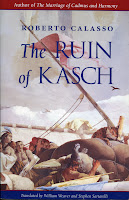 Before I make my comments about this chapter, I'd like to quote from Roberto Calasso on the elements of ritual sacrifice. Here's the first quote:
Before I make my comments about this chapter, I'd like to quote from Roberto Calasso on the elements of ritual sacrifice. Here's the first quote:Quechcotona, in Nahuatl, means both "to cut off someone's head" and "to pick an ear of grain with one's hand." The perception which lies at the heart of sacrifice is, in fact that every act of picking is also a killing --- that any uprooting, any detaching of something from what it is connected to (and if we go from one link to the next, this is nothing but the All), is a killing. But life, if it is to be perpetuated, demands that something be picked. [135]And here is the second:
In surrendering part of the world to the divinity, the sacrificer wants the divinity to surrender the rest of the world to him, and to cease intervening in its arbitrary, uncontrollable way. The sacrificer also wants the divinity's permission to use the world. Thus, the first consequence of the eclipse of sacrifice will be that the world will be used without restraint, without limit, without any part being devoted to something else. [138]I'd like to suggest that in this chapter there are two ritual sacrifices: first, of the three Federals who stole Sara's hog and some hens; and second, of the hog itself. Calasso goes on to say that "the basis of sacrifice lies in the fact that each of us is two, not one. . . . Each of us consists of the two birds of the Upanishads, on the same branch of the cosmic tree: one eats, and the other watches the one that is eating." [134]
Inman is hyper-conscious of the Federals, watching what they do at Sara's cabin and later, after they have taken her hens and the hog, in the woods. He is also hyper-conscious of his own actions in killing them: "Inman shot out the man's chest in such close range that the muzzle flash set his jacket breast afire." After the killings, Inman "found that the remaining hen had gotten free and had its head immersed in the broken open belly of his [one of the Federal's] exploded guts.
Inman, squatting on the ground and and smoking a cigarette, "watched the hen work." He then begins to hum "a sacred song" and thinks about the words, which include the phrases, "When I die I'll live again. / My soul will rejoice by the crystal river." He finishes the ritual by propping all the dead men up in a nearby cave and adding his markings to the wall:
Inman took a stick of charcoal from the old fire at the cave mouth and sketched on the cave depictions of Sara's quilt beasts that had pursued him through the dream world of the night before. In all their angularity they reminded him of how frail the human body is against all that is sharp and hard.When he gets back to Sara's cabin with the hog, they perform the second sacrifice together. The hog is "killed, scalded, and scraped of hair" and they spend the day preparing the hog "into two sides of meat, when he then further divided along the joints into the natural categories of pork."
When they are finished, Sara suggests Inman shave his beard: "I believe you'd look some better if you shaved down." Then, as night engulfs them, Sara also sings a song. Though it isn't called a "sacred" song, she "sang as if shamed by her own sounds, by the way her life voice itself aloud."
The singing carried shrill into the twilight and its tones spoke of despair, resentment, an undertone of panic. Her singing against such resistance seemed to Inman about the bravest thing he had ever witnessed. It was like watching a bitter fight carried to a costly draw.Even though Sara sings to calm her baby, the "words to the song . . were no lullaby." The song has to do with the killing at the heart of life, and it contains the words used in the title of the chapter:
I dreamed my bower was full of red swine,
And my bride bed full of blood.
No comments:
Post a Comment